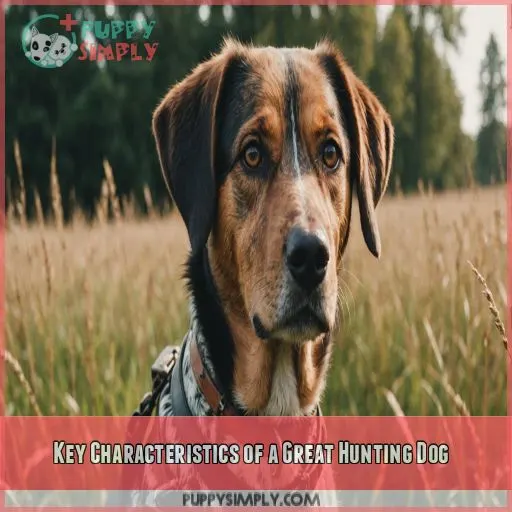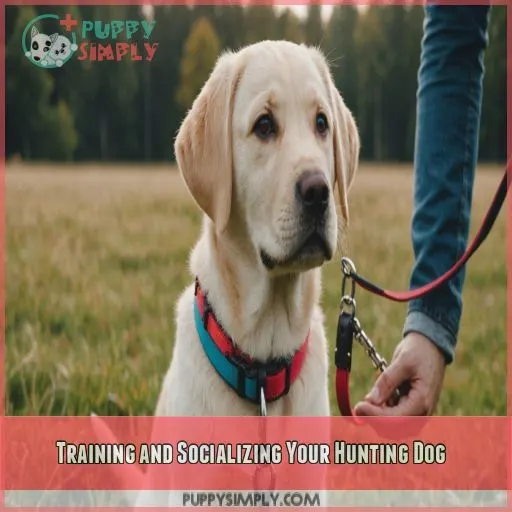This site is supported by our readers. We may earn a commission, at no cost to you, if you purchase through links.

Choosing the best Hunting Dog breed for beginners can be overwhelming.
Don’t worry, we’re here to help.
Look for breeds with a strong hunting drive, good nose, and high energy level.
As a beginner, you’ll want a breed that’s easy to train and keen to please.
English Setters, Labradors, and German Shorthaired Pointers are top picks for newbies.
They’re versatile, friendly, and love to learn.
With the right breed by your side, you’ll be bagging game in no time – and that’s just the beginning!
Table Of Contents
- Key Takeaways
- Choosing the Right Breed for You
- Key Characteristics of a Great Hunting Dog
- Hunting Dog Breeds by Sporting Type
- Tips for Selecting a Hunting Dog Puppy
- Training and Socializing Your Hunting Dog
- Common Mistakes to Avoid When Choosing a Hunting Dog
- Frequently Asked Questions (FAQs)
- What is the best hunting dog for beginners?
- What is the friendliest hunting dog?
- What is the #1 hunting dog?
- What is the easiest gun dog to train?
- What are key factors in hunting dog nutrition and health?
- How do I introduce my hunting dog to loud noises?
- Can I train a hunting dog without professional help?
- How do I care for my hunting dogs paws and feet?
- What is the ideal age to start training a hunting dog?
- Conclusion
Key Takeaways
- You’re not just buying a dog, you’re investing in a partner – prioritize hunting drive and instinct over looks, and research the breeder and bloodlines to ensure you’re getting a pup that’s bred to hunt, not just look good in the show ring.
- Consider your lifestyle and living situation before bringing home a furry friend – think about your energy level, available space, and whether your new buddy will thrive in your environment.
- Don’t underestimate the importance of training and socialization – invest time in obedience commands, housebreaking, and socialization to create a well-rounded hunting buddy that’s a joy to be around.
- Your hunting dog’s health and nutrition are crucial to their performance – focus on high-quality protein, the right amount of fat, and essential vitamins and minerals, and monitor their weight to keep them in top shape for hunting season.
Choosing the Right Breed for You
When choosing the right breed for you, it’s important to think about your hunting style and terrain to make sure your new furry companion can keep up and excel in the field.
You should also consider your lifestyle, living situation, and the breed’s temperament, energy level, grooming needs, and training requirements.
Consider Your Hunting Style and Terrain
Choosing the right hunting dog breed is crucial for a successful hunting partnership.
You need to consider your hunting style and the terrain you’ll be hunting in.
Think about the type of game you’ll be hunting, the climate, and the terrain.
Are you hunting upland birds in wide-open spaces or waterfowl in marshy areas?
Different breeds excel in different environments, so choose a breed that matches your hunting style and terrain.
Think About Your Lifestyle and Living Situation
When choosing a hunting dog breed, it’s really important to think about your lifestyle and living situation. Here are some key factors to keep in mind:
- Space: Do you have a large yard or live in an apartment? Some breeds need more space to run and play, while others are better suited for smaller living spaces.
- Time: How much time can you dedicate to training and exercising your dog? Hunting dogs need mental and physical stimulation, so make sure you can commit the necessary time.
- Energy: Think about your own energy levels and activity preferences. If you prefer a more relaxed lifestyle, a high-energy dog mightn’t be the best fit.
- Budget: Dogs can be expensive, from upfront costs to ongoing expenses like food and vet care. Be sure to factor this into your decision.
Breed Temperament and Energy Level
When choosing a hunting dog breed, consider a temperament that matches your lifestyle. If you’re an energetic hunter, a high-energy breed like a German Shorthaired Pointer might be perfect. But if you’re a laid-back hunter, a calm breed like an English Setter could be a better fit. Your dog’s energy level should complement yours, not clash with it.
Grooming and Training Needs
Now that you’ve considered breed temperament and energy level, it’s time to think about grooming andNow training needs that. You you want a’ve hunting dog that fits considered your lifestyle, not one your that’ll drive lifestyle you crazy with high and a breed’s temperament maintenance demands,. Here are some let essentials to’s consider:
get Grooming practical frequency: Some – breeds require daily grooming brushing and, training while needs others are need crucial a weekly. You nail want a hunting dog that fits your busy schedule, not one trim.
that Training adds stress. Here are key things to consider:
- Grooming frequency: Some breeds need daily brushing, while others are low-maintenance.
- Training schedule schedule:: Plan for regular sessions, even if it’s just 10 minutes a day.
- Essential tools: Invest in a good brush, nail clippers, Set aside and training treats.
- Common challenges: time for Be prepared for shedding, chewing, and the occasional accident.
- Training resources: Research online tutorials, training classes, or work with a professional trainer obedience.
Key Characteristics of a Great Hunting Dog
As you start your journey to find the perfect hunting dog, you need to understand what makes a great one. You’ll want a dog with a strong hunting drive, good nose, intelligence, athleticism, and a strong prey drive – basically, a dog that’s born to hunt and loves to please.
Strong Hunting Drive and Instinct
A good hunting dog is all about having a strong hunting drive and instinct. This means they’re bred to hunt and please their owner. Key Characteristics of a Hunting Dog
| Breed | Drive | Trainability |
|---|---|---|
| German Shorthaired Pointer | High | Excellent |
| Labrador Retriever | High | Excellent |
| English Setter | Medium | Good |
| Brittany Spaniel | Medium | Good |
A strong hunting drive helps your dog stay focused and motivated.
Good Nose and Tracking Ability
For beginner bird hunters, a good nose and tracking ability are super important. You want a breed that can sniff out birds, like quail, with ease. Look for breeds with a strong prey drive and instinct to follow their nose. Consider nose training, scent work, and tracking trials to develop your dog’s skills.
Intelligence and Trainability
Now that we’ve covered the importance of a good nose and tracking ability, let’s talk about intelligence and trainability.
You want a hunting dog that’s smart and keen to learn.
Breed-specific intelligence varies, so research the breed you’re interested in to understand potential training challenges.
Age-related learning and genetics also impact cognitive development, so keep that in mind when choosing your loyal companion.
Athleticism and Endurance
When it comes to athleticism and endurance, you want a hunting dog that can keep up with you. Consider the following:
- Breed-specific training: Tailor exercises to your dog’s breed and hunting style.
- Conditioning exercises: Gradually increase exercise intensity to build stamina.
- Nutrition for endurance: Fuel your dog with a balanced diet for top performance.
- Impact of weather: Acclimate your dog to various weather conditions for hunting success.
Strong Prey Drive and Desire to Please
You’re looking for a hunting buddy that’s driven to please. A strong prey drive is key, but it’s equally important to have a dog that’s keen to obey. Look for breed traits that balance instinct with a desire to please. With the right training tips and an ethically bred pup, you’ll have a loyal hunting partner by your side.
Hunting Dog Breeds by Sporting Type
As you start your journey to find the perfect hunting companion, you’ll want to think about the type of hunting you’ll be doing most often and the breed that’s best suited for it.
From pointers and setters for upland game to retrievers for waterfowl and spaniels for flushing and retrieving, we’ll break down the top breeds for each sporting type to help you make an informed decision.
Pointers and Setters for Upland Game
For upland game hunting, pointing breeds like English Setters and English Pointers are top picks. They excel at locating and pointing birds, making them perfect for beginners. Consider the following:
- English Setters are known for their elegant point and adaptable range.
- English Pointers are bred for their speed and agility.
- Both breeds require consistent training and socialization to thrive in the field.
Retrievers for Waterfowl and Upland Game
You’re looking for a retriever to join your hunting adventures!
Retrievers excel in waterfowl and upland game, with breeds like Labradors and Chesapeake Bay Retrievers leading the pack.
They’re naturally talented, enthusiastic to please, and love to work.
With proper training, they’ll fetch your ducks, grouse, or rabbits with ease.
Research their specific needs, and you’ll have a loyal companion in no time!
Spaniels for Flushing and Retrieving
You’re interested in Spaniels for flushing and retrieving! These breeds are perfect for beginners, with their friendly and outgoing personalities. They excel in dense cover and love water, making them ideal for waterfowl and upland game hunting. Here are some key things to keep in mind:
- Top Spaniel Breeds: Boykin Spaniel, Water Spaniel, English Springer Spaniel, and English Cocker Spaniel
- Training Tips: Focus on positive reinforcement and early socialization
- Hunting Styles: Spaniels are perfect for flushing and retrieving in dense cover and water
- Grooming Needs: Regular brushing and occasional trimming are a must for Spaniels
Hound Dogs for Tracking and Treeing
| Breed | Description |
|---|---|
| Beagle | Friendly, curious, and energetic, with a strong prey drive |
| Coonhound | Excellent tracker with a distinctive baying howl |
| Bloodhound | Renowned for its incredible scenting ability |
| Foxhound | Bred for speed and agility, with a strong instinct to chase |
| Plott Hound | Intelligent and athletic, with a keen sense of smell |
These breeds excel at tracking and treeing, but remember to research each breed’s specific needs and traits to find the perfect companion for you.
Tips for Selecting a Hunting Dog Puppy
You’re ready to bring home a furry hunting buddy, but with so many breeds out there, selecting the right puppy can be overwhelming. By prioritizing hunting drive and instinct, researching the breeder and bloodlines, and evaluating the puppy’s temperament and energy level, you’ll be well on your way to finding the perfect companion for your hunting adventures .
Prioritize Hunting Drive and Instinct
When selecting a hunting dog puppy, prioritize hunting drive and instinct over looks.
You want a pup that’s bred to hunt, not just look good in the show ring.
Look for breeders who focus on hunting lines, not show-ring lines.
A strong prey drive and instinct will make training easier and hunting more enjoyable.
Trust us, your future hunting buddy will thank you!
Research the Breeder and Bloodlines
When researching a breeder and bloodlines, you’re basically checking out your future hunting buddy’s family tree. A reputable breeder with a proven track record is key. Here are four things to look for:
- Breeder Reputation: Research online reviews, ask for referrals, and check for certifications.
- Bloodline History: Look for bloodlines with a strong hunting success record.
- Genetic Testing: Make sure the breeder conducts genetic testing to identify potential health issues.
- Ethical Breeding: Choose a breeder who prioritizes the health and well-being of their dogs.
Look for Good Health Clearances and Testing
Now that you’ve researched the breeder and bloodlines, it’s time to scrutinize the puppy’s health credentials.
Look for health certificates, genetic testing, and clearance for breed-specific issues like hip dysplasia and eye exams.
A healthy puppy is essential for a lifelong hunting buddy.
Don’t be afraid to ask the breeder about these tests – your future hunting companion depends on it!
Evaluate the Puppy’s Temperament and Energy Level
When evaluating a puppy’s temperament and energy level, look for playfulness, curiosity, and a moderate energy level. Observe their fear response and socialization with people and other animals. Consider their training potential and whether they’ll thrive as a family dog. As a first-time bird dog owner, prioritize breeds with gentle, even temperaments for a smoother training experience.
Training and Socializing Your Hunting Dog
As you welcome your new hunting dog into the family, training and socialization become your top priorities. By investing time and effort into developing your dog’s skills and character, you’ll transform them into a loyal companion that excels in the field and at home.
Importance of Early Socialization and Training
Socializing your hunting dog early is key to raising a well-adjusted pup who gets along with other dogs and people. This process should start before eight weeks of age, when a fear period begins, and continue until 18 weeks, after which socialization becomes more difficult as dogs begin to prefer the familiar.
During this time, introduce your puppy to a variety of people, animals, places, and things
Basic Obedience Commands and Housebreaking
Now that you’ve got a head start on socialization, it’s time to focus on basic obedience commands and housebreaking. Start with potty training, crate training, and leash training. Teach your hunting buddy recall training and simple commands like "sit," "stay," and "come." Consistency and patience are key – remember, you’re building a lifelong partnership!
Advanced Training for Hunting and Retrieving
You’ve got the basics down, now it’s time to take your hunting dog to the next level.
Focus on advanced retrieving techniques, like waterfowl retrieving and scent work.
Consider field trial training to hone your dog’s skills.
Be patient and adaptable, just like your dog.
Tips for Building a Strong Bond With Your Dog
As you train your hunting dog, remember that building a strong bond is key. Use positive reinforcement, consistency, and patience to establish trust. Communicate clearly and reward good behavior. With time, your dog will become an extension of you. Even breeds like Chesapeake Bay Retrievers, known for their independence, will thrive on attention and interaction.
Common Mistakes to Avoid When Choosing a Hunting Dog
When it comes to choosing a hunting dog, it’s easy to get caught up in the excitement of bringing home a new furry friend, but overlooking some crucial factors can lead to disappointment and frustration for both you and your dog. By being aware of common mistakes to avoid, you can set yourself and your future hunting buddy up for success and a lifetime of enjoyable hunting experiences together .
Not Considering Your Lifestyle and Living Situation
When choosing a hunting dog, it’s easy to get caught up in the excitement and overlook your lifestyle and living situation. Don’t make that mistake! Consider these key factors:
- Dog-friendly housing: Do you have enough space for a dog to live comfortably?
- Training time: Can you commit to regular training sessions?
- Energy match: Does your lifestyle match the dog’s energy level?
- Space needs: Can you provide the necessary space for your dog to exercise and play?
Your future furry friend will thank you!
Not Researching the Breeder and Bloodlines
Don’t gamble with your new furry friend’s future – research the breeder and bloodlines! A reputable breeder prioritizes genetic health, temperament, and lineage history. Look for transparency about health clearances, breeding philosophy, and their reputation. Ethical breeding practices help make sure your puppy is set up for success. Your future hunting buddy will thank you!
Not Evaluating the Puppy’s Temperament and Energy Level
Don’t get caught off guard by a puppy’s cute face – it’s important to evaluate their temperament and energy level before bringing them home. A mismatch can lead to chaos. Consider these key factors:
- Puppy energy: Can you keep up with their activity level?
- Temperament mismatches: Will their personality clash with yours?
- Home life impact: How will they affect your daily routine?
Not Providing Proper Training and Socialization
Don’t set yourself up for failure by neglecting training and socialization! A hunting dog without proper training can develop behavioral issues like aggression toward humans, fear of noises, lack of focus, and poor recall. Invest time in obedience commands, housebreaking, and socialization to create a well-rounded hunting buddy that’s a joy to be around.
Frequently Asked Questions (FAQs)
What is the best hunting dog for beginners?
A million bucks can’t buy the perfect hunting buddy, but a great breed can! For beginners, consider a Labrador Retriever, German Shorthaired Pointer, or English Springer Spaniel – friendly, versatile, and enthusiastic to please, making them perfect for new hunters.
What is the friendliest hunting dog?
You’re looking for a friendly hunting dog! Consider a Labrador Retriever – they’re known for their gentle nature, keen to please attitude, and high energy levels, making them perfect for hunting and family life.
What is the #1 hunting dog?
You’re on the hunt for the ultimate hunting dog – a unicorn that’ll make you the envy of every hunting buddy! In reality, the Labrador Retriever is often considered the top dog, thanks to its versatility and beginner-friendly nature.
What is the easiest gun dog to train?
You’re looking for a gun dog that’s easy to train – consider the Labrador Retriever, known for being friendly, biddable, and keen to please, making them a top pick for beginners .
What are key factors in hunting dog nutrition and health?
Did you know that 90% of dogs seen by vets are overweight? To keep your hunting dog healthy, focus on high-quality protein, the right amount of fat, and essential vitamins and minerals . Balance is key, so monitor their weight and adjust their diet seasonally.
How do I introduce my hunting dog to loud noises?
To introduce your hunting dog to loud noises, start with low-volume sounds, like clanging pots, and gradually increase the noise level, associating it with positive experiences, such as treats and play .
Can I train a hunting dog without professional help?
You’re on your own, or so you think! While it’s possible to train a hunting dog without professional help, you’ll need to be super consistent, patient, and willing to learn from your mistakes – and your dog’s!
How do I care for my hunting dogs paws and feet?
To care for your hunting dog’s paws and feet, check for debris and clean them after each hunt . Trim their nails regularly and consider applying a paw toughener or balm to prevent cracking .
What is the ideal age to start training a hunting dog?
Hit the ground running" with your new hunting dog by starting training between 8-12 weeks old. This sweet spot allows for socialization, basic obedience, and foundational hunting skills to take root, setting you up for a lifelong partnership.
Conclusion
Now that you’ve got the lowdown on the best hunting dog breeds for beginners, it’s time to put theory into practice.
As you start this exciting journey, remember that the key to success lies in finding a loyal companion that’s as keen to learn as you are.












